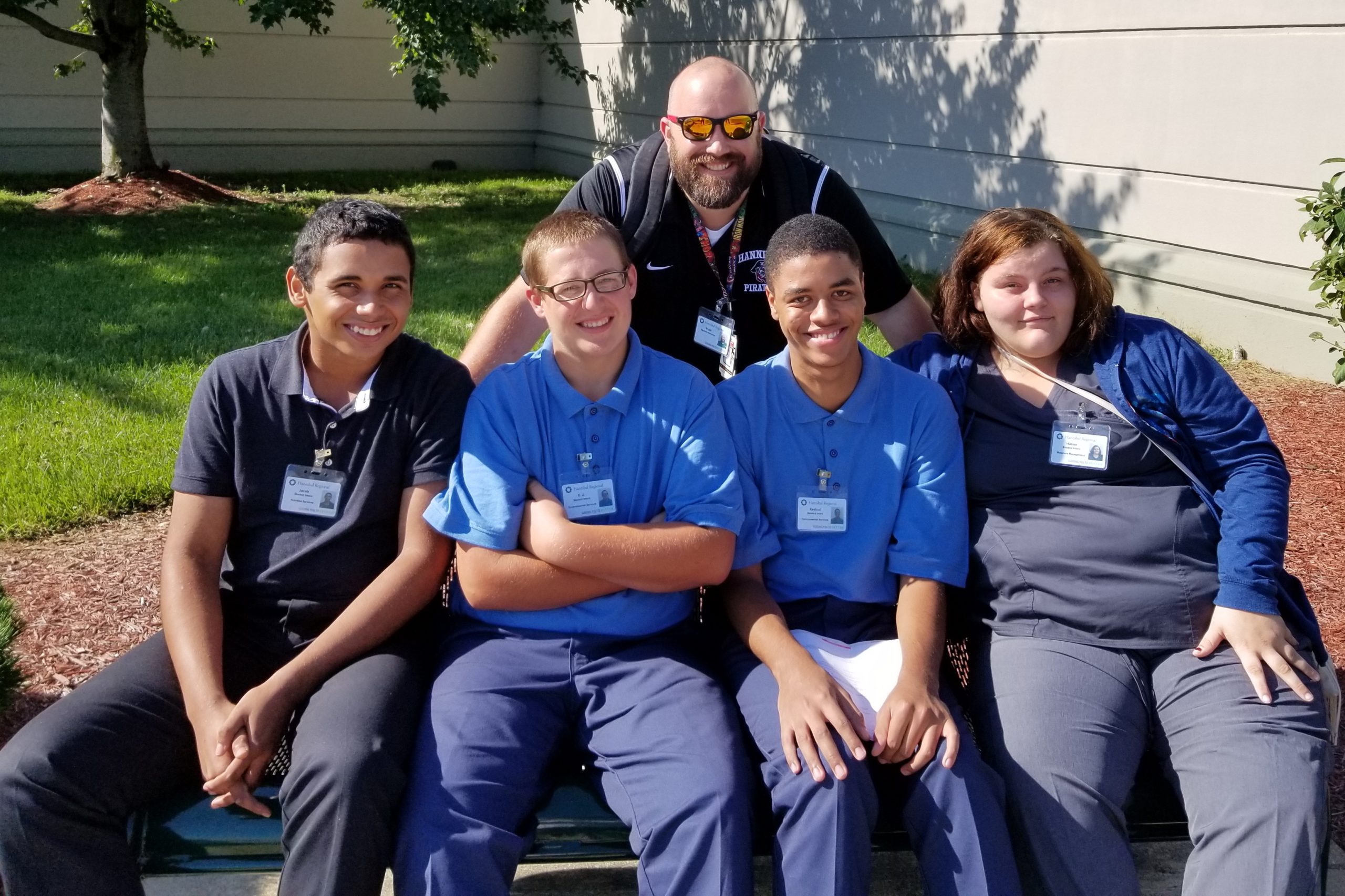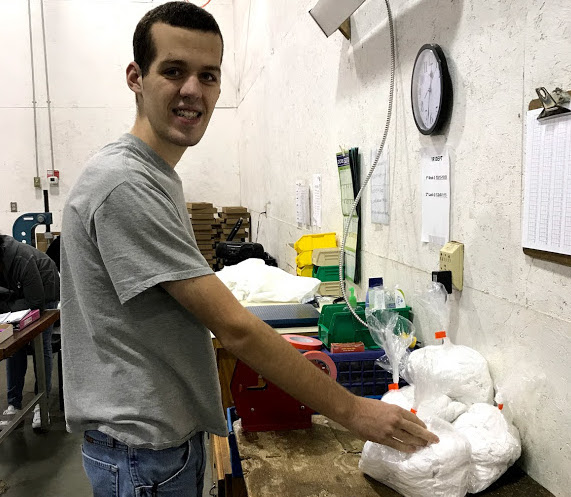The activities special education students participate in now mirror more closely mainstream college- and career-prep programs, thanks to an evolution in transition planning.
Students learn valuable soft skills for the workplace through internships at places such as local hospitals and school cafes. They also take courses at local colleges to prepare for higher education.
“The ideal scenario is that special needs students don’t notice much upheaval in their lives when they leave school and enter adulthood,” says David Test, professor of special education at the University of North Carolina at Charlotte. “The best transition is a seamless one.”
Special education rebound
Students in special education play bigger roles in IEPs to ensure transition plans incorporates their interests and post-graduation goals. School administrators now work more closely with outside agencies to support students’ shifts to productive lives after high school.
The years after the 2008 recession harmed innovative special education transition programming. But funding and interest in doing more for special education students have rebounded, Test says.
Districts make a difference in special education with the following strategies:
Hannibal Public School District
Hannibal, Mo.
B.E.S.T. (Basic Employment Skills Training)—career readiness program
Three Hannibal educators traveled about 100 miles to Columbia Public Schools, also in Missouri. They wanted to learn how Columbia’s special education students participate in hospital internships. “We left Columbia pretty motivated about starting a similar program in Hannibal,” says Brock Sousa, Hannibal’s special services instructor. “That was just 18 months ago, but it’s really where the partnership and the B.E.S.T. program started.”
Sidebar: What makes a great transition for students in special ed?
Not to say a new program—even when there’s a blueprint—just launches itself. First, high school Principal Ted Sampson and district Superintendent, Susan R. Johnson had to convince Hannibal Regional Hospital. “They were receptive, but we had to show them how exactly it would work,” says Sampson.
Once hospital administrators understood students could potentially work for the hospital or other organizations, they gave it a try.
Educators selected the first group of students carefully. Students had to have an IEP and have all of their academic credits completed. Most important, they had to be motivated. And the families and teachers had to agree the students could meet the challenges that lay ahead.

So how does the program work? Four students report to high school by 7:45 a.m., where they change into work uniforms, and then ride to Hannibal Regional. By 8 a.m., they’re in a hospital classroom, where Sousa provides instruction on soft skills, such as decision-making and conversation. Students practice filling out job applications and making rÁ©sumÁ©s.
Sousa, who’s also a driving instructor, helps students get driver’s permits so they can get to work on their own.
Creating future employees in Hannibal
By 9 a.m., the students head to work in nutritional services, housekeeping and maintenance. “They report to their managers and then follow the routines of the work shift,” says Sousa. “So they’re all eating lunch at different times, and they have very different responsibilities.”
By 1:30 p.m., they clock out and return to class to do a daily wrapup, in which they discuss workday victories and challenges before traveling back to the high school.
Job coaches, a linchpin of the program, work through Learning Opportunities Quality Works. Marion County Services for the Developmentally Disabled and County Connections pays for the coaches. The school district juggled resources to allow Sousa to be on-site, and the class fundraised for uniforms.
After one semester, students mastered skills at an impressive rate. “The interns are exceeding our expectations,” says Sousa. “They are further along than we ever anticipated.”
The students gain so much work experience—for example, with waxers, buffers and other maintenance equipment—that Superintendent Johnson says they may be more qualified than the average applicant for certain custodial jobs. Next year, the district hopes to expand the program to eight or 10 students.
“These are students who are most likely going to be living in our community for their entire lives, so it’s exciting to figure out ways they can contribute and be productive,” Johnson says. “With this experience, I’d be very comfortable having them employed in our school district someday.”
Boston Public Schools
KEE (Knowledge. Enrichment. Engagement.) transitional program—college readiness program
Advocates recognize that soft skills, such as time management, organization and communication, can hinder special educations students who have the desire and intellectual capability to attend college.
One remedy gives special needs students as much exposure as possible to a college setting, says Cindie Neilson, assistant superintendent for special education at Boston Public Schools. The district’s KEE partnership with Roxbury Community College, which began in spring 2018, hold particular promise.
Sidebar: Organizations offer PD for special ed transition planning
About 12 special needs students, ages 18 to 22, spend 9 a.m. to noon at the college, four days per week. The program blends functional academics with direct instruction of life skills and vocational training in internships at the campus coffee shop, cafeteria, print shop and elsewhere.
Students apply to both Roxbury College and KEE.
“Part of the program includes learning all those really important skills that any college student might need—how to advocate for yourself, how to deal with social pressure and how to talk to professors,” says Neilson.
The students receive one college credit because KEE folds in a college experience class, a modified version of a class all Roxbury students take. Ultimately, the program—which can last up to two years—prepares students to take additional college classes. Not all will continue with higher education, though, says Roni Caulfield, director of KEE.
“Two semesters in and I’d say we’re pretty successful,” says Caulfield. “We have at least four out of the 12 students already successfully taking at least one additional college class.”
Read more: Edtech equalizers in special education
The students also launched their own Japanese anime club on campus. KEE students serve as board members, and any student can join.
Neilson calls the cost to the district—about $300 per student per semester—a bargain. Caulfield and the district are pursuing additional funding in hopes of expanding KEE.
Cleveland County Schools
Cleveland County, N.C.
Future Ready OCS (Occupational Course of Study)—career readiness program

The Future Ready OCS program serves about 130 students with both intellectual and adaptive skill challenges. The academic coursework encompasses all the requirements needed to obtain a high school diploma.
In addition to academics, students take at least six credit hours of training in soft skills. This covers everything from exploring their interests to conversation skills and how to apply for a job. Students also benefit from on- and off-campus occupational training that’s based on interests identified through assessments and evaluations.
Read more: Voice & choice drives edtech in special education
The students then participate in job shadowing, simulated work settings, and school-based enterprises such as the coffee shop or craft store.
“We’re often able to secure internships for students, and ultimately, many are placed in part-time jobs,” says Nellie P. Aspel, the district’s executive director of exceptional children. The district’s vocational rehabilitation counselors—who function as career counselors and job placement specialists—team up with classroom teachers, says Aspel.
“The counselors help with transition planning, developing individual work plans, and even developing relationships with employers,” Aspel says.
The teacher-career coach combo has been so successful that the district looks forward to expanding the concept. Thanks to a workforce investment opportunity grant, the district will add career coaches in all schools. “Additional coaches will provide lessons to not only our students in the occupational course of study, but also to all students in the district,” says Aspel.
Victoria Clayton is a freelance writer in Southern California.







